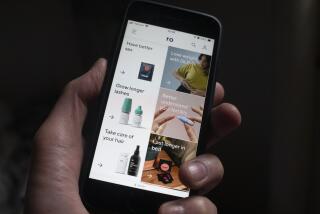Editorial: Can ZendyHealth be the Priceline of healthcare?

Can ZendyHealth be for healthcare what Priceline was for discounted airfare? Above, actor William Shatner is his role as a Priceline spokesperson.
- Share via
The 1990s were a fabulous time for the music industry, thanks to the burgeoning popularity of CDs and hitmakers such as Michael Jackson and Garth Brooks. But the major record labels were blindsided at the end of the decade by the launch of Napster, an online music sharing service, and by 2001, CD sales were in free fall.
Now movie studios and book publishers are going through similar disruptions as their products shift from analog to digital formats. But in his new book, “Vaporized: Solid Strategies for Success in a Dematerialized World,” former Sony executive Robert Tercek argues that the changes wrought by high-speed, ubiquitous Internet connectivity are bound to spread broadly across the economy. As tasks once performed by specialized machines are translated into software programs, and physical products become digitally delivered services, basic functions of commerce are being transformed, traditional sales channels are being displaced and established players are being circumvented.
A good illustration of this is ZendyHealth, a Los Angeles-based start-up that wants to bring Priceline’s model for discounted airfare and hotel rooms to healthcare. Launched in April, the site allows users in search of certain diagnostic services and treatments, such as a CT scan, teeth cleaning or a Botox injection, to submit a price they’d be willing to pay and see if any of the participating laboratories, dentists or cosmetic surgeons is willing to accept it. The point, its founders say, is to give care providers a way to fill the gaps in their appointment calendars while giving consumers a chance to find independent and more affordable sources of care.
The concept seems risible at first — people tend to be concerned more with the quality of their care than how cheaply it can be obtained. But with health insurance policies imposing considerably larger deductibles, consumers who once paid no attention to the cost of care may now feel the need to shop around instead of simply going to the lab or the specialist that their primary-care doctor recommends. Meanwhile, with insurers trying to hold down payments to physicians, there’s a growing incentive for doctors to offer services directly to cash-paying patients.
ZendyHealth may not succeed at meeting those needs; much depends on its ability to persuade doctors and labs to use its platform, and so far it has only about 400 in the Los Angeles area. Yet it shows how ripe healthcare services are for new ways of delivering care. It’s easy to imagine other sites bringing alternative ways for consumers to shop for healthcare services, whether it be EBay-style auctions or Amazon-esque bazaars. If it can happen in healthcare, with its byzantine and incomprehensible pricing, it can happen in any industry. And it will.
Follow the Opinion section on Twitter @latimesopinion and Facebook
More to Read
A cure for the common opinion
Get thought-provoking perspectives with our weekly newsletter.
You may occasionally receive promotional content from the Los Angeles Times.






